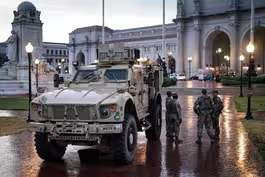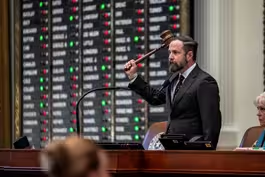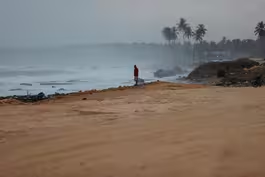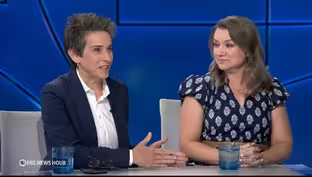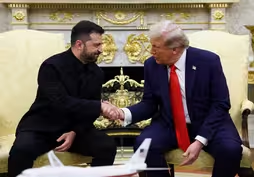
Would ceding land bring peace to Ukraine? Experts weigh in
Clip: 8/18/2025 | 10mVideo has Closed Captions
Would ceding territory to Russia actually bring lasting peace to Ukraine? Experts weigh in
For perspective on Monday's meetings at the White House and the negotiations to end the war in Ukraine, Geoff Bennett spoke with Charles Kupchan and David Kramer. Kupchan served on the National Security Council staff during the Obama and Clinton administrations, and Kramer was Assistant Secretary of State for Democracy, Human Rights and Labor during the George W. Bush administration.
Problems playing video? | Closed Captioning Feedback
Problems playing video? | Closed Captioning Feedback
Major corporate funding for the PBS News Hour is provided by BDO, BNSF, Consumer Cellular, American Cruise Lines, and Raymond James. Funding for the PBS NewsHour Weekend is provided by...

Would ceding land bring peace to Ukraine? Experts weigh in
Clip: 8/18/2025 | 10mVideo has Closed Captions
For perspective on Monday's meetings at the White House and the negotiations to end the war in Ukraine, Geoff Bennett spoke with Charles Kupchan and David Kramer. Kupchan served on the National Security Council staff during the Obama and Clinton administrations, and Kramer was Assistant Secretary of State for Democracy, Human Rights and Labor during the George W. Bush administration.
Problems playing video? | Closed Captioning Feedback
How to Watch PBS News Hour
PBS News Hour is available to stream on pbs.org and the free PBS App, available on iPhone, Apple TV, Android TV, Android smartphones, Amazon Fire TV, Amazon Fire Tablet, Roku, Samsung Smart TV, and Vizio.
Providing Support for PBS.org
Learn Moreabout PBS online sponsorshipGEOFF BENNETT: And for perspective on today's meetings at the White House and the negotiations to end the war in Ukraine, we get two views now.
Charles Kupchan served on the National Security Council staff during the Obama and Clinton administrations.
He's now a senior fellow at the Council on Foreign Relations and a Georgetown University professor.
And David Kramer was assistant secretary of state for democracy, human rights and labor during the George W. Bush administration.
He's now executive director of the George W. Bush Institute, a think tank that focuses on domestic and international issues.
It's great to have you both here.
Charles, we will start with you.
Do you believe this proposal on the table, Ukraine surrendering territory in exchange for as yet vague promises of security, do you believe that is a credible pathway toward a lasting peace?
CHARLES KUPCHAN, Former National Security Council Official: I would say that it's a framework that has potential.
There are a lot of details that we just don't know yet.
And as a consequence, we don't know whether this is going to flame out at the next level when Putin, Zelenskyy, and Trump sit down, or whether there really is a foundation here for moving forward.
I think there are two critical issues that one needs to focus on.
One is this land swap that has been put forward.
No question that it would be a bitter pill for Zelenskyy to cede land in Donetsk, about 30 percent of it Ukraine still controls, over to Russia, even though many, many tens of thousands of Ukrainians have died on those territories defending that territory, industrial important area, minerals, resources, and strategic importance, because it's a front line that's fortified.
The other key issue, and this in some ways I think is the $6 million question, is, what is Putin prepared to accept on the other side of that cease-fire line?
Is Putin ready to let Ukraine go?
Is Putin ready to acknowledge that he has lost the 80 percent of Ukraine that is still Ukraine, let it have the army that it desires, let it have Western security guarantees?
We don't yet have the answer to that question.
Putin needs to be smoked out.
I think that's the critical question that will determine whether Zelenskyy can say yes to this deal.
GEOFF BENNETT: And, David, how do you see it?
Do you agree that this is a framework with potential?
Are there too many concessions here that could potentially leave Ukraine dangerously exposed?
DAVID KRAMER, Former U.S. Assistant Secretary of State: I think it is a framework for potential.
And I think it's also a vast improvement over where U.S. policy was last Friday in Anchorage.
There, I think Putin felt he came away from the Anchorage summit with most of the points scored on his side.
Today, I imagine Putin isn't feeling so confident about things.
I think the display of unity and solidarity with the European leaders together with President Trump with Zelenskyy sent a very powerful signal that Putin's efforts to sow divisions on the transatlantic alliance are not going to succeed.
And so I think, there, that was a huge improvement from Ukraine's vantage point.
I do think that the administration is going to struggle with the issue of a cease-fire.
This is something, of course, President Trump supported before last Friday's summit.
It's something he has backed off and wants to pursue a larger peace deal.
But it will be very difficult for President Zelenskyy to agree to sit down with Putin while Russian missiles, drones, and other bombs do tremendous damage to the Ukrainian people.
I do think a cease-fire is something that the president should support.
It's something the Europeans want.
It's something the Ukrainians want as well.
But the biggest question mark out there will be the security guarantees that were talked about extensively today without shedding a great deal of clarity on what they mean.
GEOFF BENNETT: On this matter of a cease-fire, Charles, is President Trump right when he says it's not realistic to expect that Vladimir Putin would agree to a cease-fire?
CHARLES KUPCHAN: You know, I agree with David that, everything else being equal, you stop the killing now and then you talk about the peace terms after the bloodshed has ceased.
I'm guessing that Trump asked for that in Alaska, because that was the deal that was struck in conversations with European allies before Trump went out to meet Putin.
And Putin probably said no out of hand.
And that's because he thinks that he has maximum leverage while he is still killing Ukrainians.
And if he stops, then the pressure is off Zelenskyy, and he's less likely to get a good deal.
And then on the security guarantees, it is really in some ways the most ambiguous part of this deal.
And I do think that there's some tension here, right?
You have in President Trump, in Vice President J.D.
Vance individuals that have been on record saying, I don't want to send any more weapons to Ukraine.
I don't want to offer NATO membership to Ukraine.
But they're still talking about something that would be Article 5-like.
That's pretty close to a treaty ratified, guarantee the security of Ukraine.
And so I think there's a big discussion that needs to happen inside the Trump administration about precisely what it is prepared to do to grant security guarantees to Ukraine, and, importantly, what the Europeans are prepared to do, because, there, there is actually talk about a coalition of the willing that would put boots on the ground to serve as a deterrent force against a restart of this war by Russia.
Russia is still saying, hey, we don't want any foreign troops and particularly NATO troops on the ground, so a lot, a lot of hard conversations ahead if we're going to see this dialogue go forward.
GEOFF BENNETT: Well, on both those points, David, what kind of support can Volodymyr Zelenskyy count on from the Trump administration?
And do you believe major European powers like France, Germany, the U.K. are truly prepared to put troops on the ground in Ukraine to prevent further Russian aggression?
DAVID KRAMER: Geoff, let me first say on a cease-fire, the reason Putin doesn't support a cease-fire is he doesn't support peace in Ukraine.
He wants to take over Ukraine.
He wants to decapitate the Ukrainian government.
He wants to control Ukrainian territory.
And he wants to make sure that Ukraine never moves toward the West or become a successful democracy that could pose a real threat as a competitor to Russia's corrupt authoritarian regime.
But I think the West can do things to make Putin an offer he can't refuse by moving ahead with the sanctions.
I don't think Secretary Rubio is right.
I think the sanctions are what Putin wants to avoid if we impose tough sanctions, if we went ahead with the tariffs against China, as we have done with India because of their extensive imports of Russian energy, if we move ahead with not just freezing but seizing the $300 billion in Russian assets that are in Western financial institutions and make it very clear we're going to continue the military support for Ukraine.
President Putin should not have a veto over whether Ukraine allows foreign forces, invited foreign forces, on its territory.
Russian forces are not invited.
They're invaders.
They're occupiers.
They're committing war crimes and crimes against humanity.
But if Ukraine needs European forces, possibly even American troops on the ground to secure its safety and security, then that's Ukraine's right to decide.
GEOFF BENNETT: We have got a couple of minutes left, and I want to get you both to weigh in on this question.
If this war ends with Ukraine losing significant territory, but gaining security guarantees, does that ultimately strengthen or weaken the global norms against territorial conquest?
David, we will start with you.
DAVID KRAMER: This is a war that is not just between Russia and Ukraine.
It's not just a European conflict.
This is a war that has global implications.
We saw that in 2022, when Russia tried to block Ukrainian exports of agricultural and other products through the Black Sea.
We saw it with the spike in energy prices in 2022.
But also we have to be very mindful that the Communist Party leadership in China is watching whether the West will sustain its support for Ukraine.
Among Ukraine's strongest supporters are Taiwanese.
They understand that how we help Ukraine, how we sustain our assistance for Ukraine will have an impact on the thinking in Beijing vis-a-vis Taipei.
So, this is a conflict that has global repercussions and ramifications.
And it's important that we sustain our support for Ukraine, that we also encourage the Europeans to do so.
The Europeans have certainly stepped up.
GEOFF BENNETT: Charles?
CHARLES KUPCHAN: Geoff, I think, under the best of possible circumstances, the outcome of this war will constitute a setback for global norms, because the Ukrainians are going to lose some percent of their territory.
Russia will have taken a chunk out of Ukraine by force.
But the reality is that Ukraine doesn't have the capability to push them out.
And, ultimately, you have to allow pragmatism to trump principle.
So, if Ukraine can see itself to turn into a success story, defensible, secure, democratic, anchored in the West, security guarantees from European countries and the United States, I think Zelenskyy should take this deal, because it's the best offer he's going to get.
And the alternative is a war that grinds on for years that could ultimately turn Ukraine into a failed state.
GEOFF BENNETT: Charles Kupchan, David Kramer, thank you both for your time and for your insights this evening.
We appreciate it.
DAVID KRAMER: Thank you.
How D.C. residents feel about crime and the federal takeover
Video has Closed Captions
Clip: 8/18/2025 | 7m 10s | How D.C. residents feel about crime and the federal takeover of their city (7m 10s)
How partisan redistricting fights could decide next Congress
Video has Closed Captions
Clip: 8/18/2025 | 5m 58s | How partisan redistricting battles could decide the next Congress (5m 58s)
New album reveals intimate reflections by Woody Guthrie
Video has Closed Captions
Clip: 8/18/2025 | 8m 26s | Newly released tapes reveal intimate reflections by Woody Guthrie (8m 26s)
News Wrap: Hurricane Erin roaring past Bahamas
Video has Closed Captions
Clip: 8/18/2025 | 4m 57s | News Wrap: Hurricane Erin roaring past Bahamas (4m 57s)
Tamara Keith and Amy Walter on the politics of redistricting
Video has Closed Captions
Clip: 8/18/2025 | 7m 48s | Tamara Keith and Amy Walter on whether Democrats can overcome GOP redistricting advantages (7m 48s)
Zelenskyy gets promises of U.S. support in Trump talks
Video has Closed Captions
Clip: 8/18/2025 | 8m 5s | Zelenskyy gets promises of long-term U.S. support in White House talks with Trump (8m 5s)
Providing Support for PBS.org
Learn Moreabout PBS online sponsorship
- News and Public Affairs

FRONTLINE is investigative journalism that questions, explains and changes our world.

- News and Public Affairs

Amanpour and Company features conversations with leaders and decision makers.












Support for PBS provided by:
Major corporate funding for the PBS News Hour is provided by BDO, BNSF, Consumer Cellular, American Cruise Lines, and Raymond James. Funding for the PBS NewsHour Weekend is provided by...
